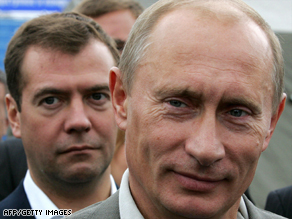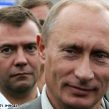
WHAT ROLE FOR SILOVIKI IN THE PUTIN-MEDVEDEV MARRIAGE?
Publication: Eurasia Daily Monitor Volume: 4 Issue: 237
By:

The resolution of the protracted intrigue around the transfer of supreme political power in Russia appears to leave everybody happy. Dmitry Medvedev, the president-to-be, appeals to the electorate as someone attentive to social needs, to the business elite as a man familiar with managing large companies like Gazprom, and to Western politicians and investors as reasonably “liberal” (Ezhednevny zhurnal, December 10; New Times, December 18).
Vladimir Putin, future prime minister by choice, has guaranteed the continuity of the course of prosperity without reforms and secured massive public support for the leadership. The feeling of relief is so overwhelming that few among the Moscow elite pay attention to the “slight bizarreness” of this succession procedure, as one political commentator put it, or takes time to ponder what the heart-stopping suspense was really about (Kommersant-Vlast, December 17). This comfortable “confidence in tomorrow,” as Russians have said since Soviet times, may again turn out to be an illusion, since the design of the two-headed political construct is rather unnatural, and there is a significant faction among the political class that has reasons to exploit its fragility.
Putin’s expressed readiness to step down to the number two position in the state hierarchy invites more serious questions than just whether the presidential portrait would grace his modest office in the White House or how would it feel for him to rise from his chair together with other top officials when President Medvedev enters the Security Council chamber (Ezhednevny zhurnal, December 18). In the lengthy interview granted to Time, which named Putin its “Person of the Year,” he denied that any redistribution of responsibilities from the presidential administration was in the cards, despite the increased bureaucratic activities registered by the Russian media (Newsru.com, December 20). The main question is indeed not about gathering more power in the office of prime minister, but about carrying out the responsibilities that belong there. It is the head of the government who has to deliver on all the generous promises made on the campaign trail, particularly salary increases, and to sort out the budget consequences related to the accelerating inflation, among other woes. In the Russian political tradition, the blame for economic setbacks and mishaps is placed squarely on the government, and Putin would have a limited choice of lower-ranked scapegoats (Nezavisimaya gazeta, December 18). He is not known as a workaholic, and it is rather hard to believe that he has opted to finally get his hands dirty by engaging in the practical management of the economy, which is sliding toward troubles caused by external turbulences and internal inefficiency (Kommersant, December 12).
While the awkward maneuver of becoming a subordinate to his most humble lieutenant may not be the best way out of the constitutional problem of changing the leader in the extremely centralized system of power, it may be the only possible escape from the trap built into this system. Indeed, while the combination of two all-powerful bosses is never functional, any option that made Medvedev into a bona fide successor would have never worked. Nor can he be compared with Putin, who could never possibly be wrong, according to Vladimir Churov, the head of the Central Electoral Commission (Kommersant-Vlast, December 19). The political elite regards Medvedev as too weak to arbitrate the dogfights among courtiers and the clashes of bureaucratic titans, so Putin has to stand by his man. Even such a political tandem may crash, since formally it is the president who controls all the ministries, agencies, and services that have enforcement capabilities, and their heads, often collectively labeled as siloviki or “power-wielders,” have little fear of or respect for the new commander-in-chief.
Putin has handpicked and reshuffled them, looking for loyalty above any other qualifications, but the corrupting effect of unaccountable power has been at work for a long time, and each clan has grown rich and greedy on its own business interests. Indeed the only question in the interview with Time that irked Putin and got a stern answer was about corruption in his inner circle (Newsru.com, December 19). He probably knows more than he wants to know on this matter, and he understands the risks stemming from the mercantilization of the special services. He was building suspense in the succession process not for personal fun or public entertainment, but in order to increase tensions among various siloviki clans and provoke feuds. They gladly cooperated, so that the hatred between FSB Director Nikolai Patrushev and “drug tsar” Viktor Cherkesov was exposed to the media and the clash between Prosecutor General Yuri Chaika and the Investigation Committee formally subordinated to him became embarrassing (Vremya novostei, December 7). Adding fuel to this fire, Putin promoted a new clan led by Prime Minister Viktor Zubkov and Defense Minister Anatoly Serdyukov, so that his master-stroke with “crowning” Medvedev caught them all flat-footed. Sergei Ivanov, who belonged to neither clan but portrayed himself as a candidate representing the siloviki as a class, has been unceremoniously shoved.
Putin has won a crucial tactical victory over his own court, but the game is not yet over. It is useful to remember that in September 1999 it took deadly explosions at two apartment complexes houses in Moscow to put him ahead in the presidential contest. The great resonance in Moscow from the report “Alternative Futures for Russia to 2017,” in which Andrew Kuchins of the Center for Strategic and International Studies outlined a scenario for a siloviki coup triggered by Putin’s murder, indicates that much uncertainty and fear hides behind the façade of political unity (Kommersant, December 13). Such murky figures as Igor Sechin, deputy head of the presidential administration, Justice Minister Vladimir Ustinov, or Vladimir Yakunin, the head of Russian Railways, have a lot at stake and now feel betrayed after all the hard work to force Putin to stay for a third term. Medvedev, who on every stage of his desk career has tried to avoid making enemies, finds himself in a rich terrarium of deadly vermin – and Putin can cover his back only so far.




